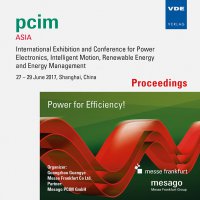A New High Power Solar Inverter Topology with Reduced DC Potential for Enhanced Reliability
Konferenz: PCIM Asia 2017 - International Exhibition and Conference for Power Electronics, Intelligent Motion, Renewable Energy and Energy Management
27.06.2017 - 29.06.2017 in Shanghai, China
Tagungsband: PCIM Asia 2017
Seiten: 6Sprache: EnglischTyp: PDF
Persönliche VDE-Mitglieder erhalten auf diesen Artikel 10% Rabatt
Autoren:
Sekhar, K. Ramachandra; Kawashima, Tetsuya (Research & Development Centre, Hitachi India Pvt. Ltd., Bangalore, Karnataka, 560 055, India)
Bhatt, Aalok (Research & Development Centre, Hitachi Hirel Power Electronics Gandhinagar, Gujarat, 382 044, India)
Inhalt:
Along with the growth of solar energy deployments, the demand of solar inverters is increasing. To match the market demand, it is necessary to look for high power inverter with higher DC bus voltages. But the higher DC bus voltages always implicate other consequences like high voltage stress on switching devices during switching and limited switching device options during the selection. The high voltage stress need to handle with high priority other wise it would lead to frequent failure of inverter switches ultimately affect the reliability of the solar inverter in the field. In order to increase the reliability of the solar inverter, it is necessary to investigate new configuration which can operate with lower DC bus voltages. In this work a dual inverter based configuration is proposed for the solar energy conversion. The proposed configuration consist of two inverters connected back to back of the transformer primary winding and secondary winding connected to grid through filter. Since the two inverters connected back to back and synthesize voltage 180 phase shift with each other, half of the DC bus is sufficient to synthesize required grid voltage using proposed configuration. A new decoupled based PWM technique is implemented on the proposed configuration to derive the desired grid voltage using two inverters present in the proposed configuration. In solar farm, the two inverter connected to two different isolated voltage string not always guarantee to obtain equal DC bus voltages for each inverter. The proposed PWM technique would provide solution that irrespective variation of DC bus voltages, it ensure to derive constant grid voltage. The efficacy of the proposed dual inverter configuration with decoupled PWM technique substantiated with MATLAB simulations.


